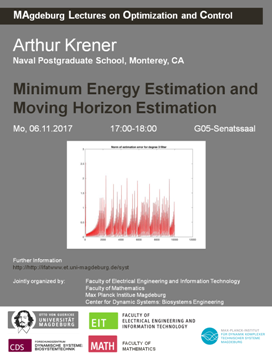MAgdeburg Lectures on Optimizaiton and Control (MALOC) in the Winter Semester 2017/18

Minimum Energy Estimation and Moving Horizon Estimation
Speaker
Department of Applied Mathematics
Naval Postgraduate School, Monterey, CA
Time and Place
Abstract
Minimum Energy Estimation is a way of filtering the state of a nonlinear system from partial and inexact measurements. It is a generalization of Gauss' method of least squares. Its application to filtering of control systems goes back at least to Mortenson who called it Maximum Likelyhood Estimation. For linear, Gaussian systems it reduces to maximum likelihood estimation (aka Kalman Filtering) but this is not true for nonlinear systems. We prefer the name Minimum Energy Estimation (MEE) that was introduced by Hijab. Both Mortenson and Hijab dealt with systems in continuous time, we extend their methods to discrete time systems and show how power series techniques can lessen the computational burden. Moving Horizon Estimation (MHE) is a moving window version of MEE. It computes the solution to an optimal control problem over a past moving window that is constrained by the actual observations on the window. The optimal state trajectory at the end of the window is the MEE estimate at this time. The cost in the optimal control problem is usually taken to be an L2 norm of the three slack variables; the initial condion noise, the driving noise and the measurement noise. MHE requires the buffering of the measurements over the past window. The optimal control problem is solved in real time by a nonlinear program solver but it becomes more difficult as the length of the window is increased. The power series approach to MME can be applied to MHE and this permits the choice of a very short past window consisting of one time step. This speeds up MHE and allows its real time implementaion on faster processes. We demonstrate its effective on the chaotic Lorenz attractor.
Information about the Speaker
Arthur J. Krener was born in Brooklyn, New York in October, 1942. He received the BS (1964) from the College of the Holy Cross, the MS (1967) and PhD (1971) from the University of California, Berkeley all in Mathematics. He was an Assistant, Associate, Full and Distinguished Professor of Mathematics at the University of California, Davis for 35 years. He was Department Chair for five years. The University established the Krener Assistant Professorships in his honor. He has held visiting positions at Harvard University, Imperial College, the University of California, Berkeley, NASA Ames Research Center, the University of Paris, the University of Maryland and North Carolina State University. In 2006 he joined the Department of Applied Mathematics at the Naval Postgraduate School where he is currently a Research Professor. He is a leader in developing methods for the control and estimation of nonlinear dynamical systems. Krener has also been a leader in the development of software tools for nonlinear control. His Nonlinear Systems Toolbox is a suite of MATLAB routines that implement a variety of the latest methods of nonlinear control. He is a Life Fellow of the Institute of Electrical and Electronic Engineers (IEEE), a Fellow of American Mathematical Society (AMS), a Fellow of the Society for Industrial and Applied Mathematics (SIAM) and a Fellow of the International Federation for Automatic Control (IFAC). He has won numerous awards including a Guggenheim Fellowship (2002), the SIAM Reid Prize (2004), the IEEE Bode Lectureship (2006), the IFAC Certificate of Excellent Achievements (2010), the American Automatic Control Council Bellman Award (2012) and the IEEE Field Award in Control (2016).